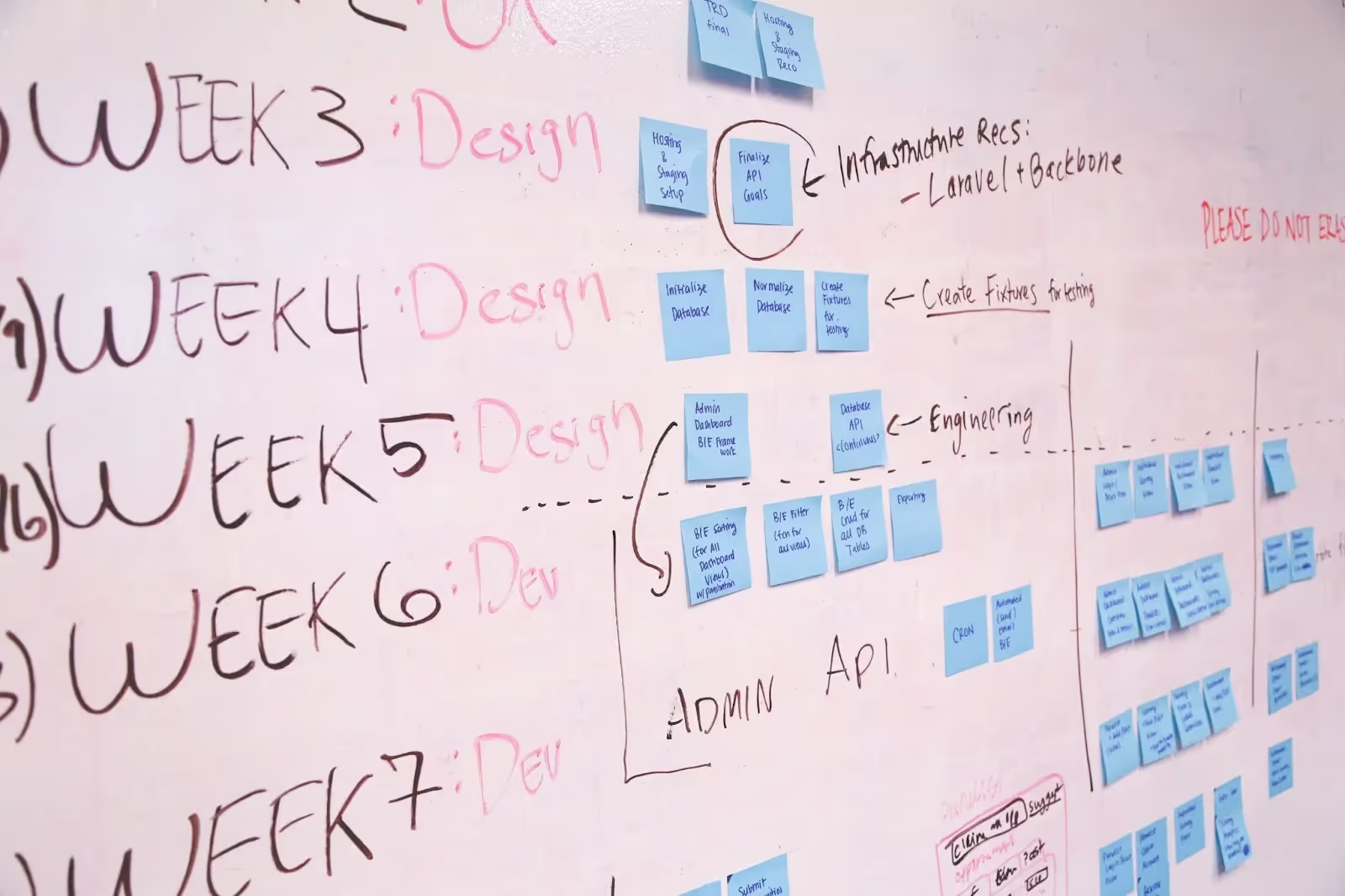In today's fast-paced tech environment, considering outsourcing or nearshoring for DevOps can be a strategic move to streamline operations and cut costs.
If you are a hiring manager or recruiter for DevOps talent, this article will arm you with a robust checklist that serves as a roadmap for navigating the complex process of outsourcing or nearshoring DevOps. Taking the time to have a clear internal assessment will put you in a stronger position to articulate your needs, filter through the noise, and find an agency that truly aligns with your goals.
Keep in mind that the DevOps outsourcing agency landscape is saturated with firms promising to be the "perfect fit" for your specific needs. Most will not say they can't handle your needs, making it crucial to conduct a rigorous internal assessment before you even get on a call with potential agencies.
Almost all outsourcing agencies will never say they can’t handle your requests. Here we equip you with the right questions to ask and consider before you embark on the journey of building a DevOps team through an outsourcing or nearshoring agency.
After reading this article, you'll be able to:
- Have tactical questions you can ask on a discovery call to ascertain if the agency will truly meet your needs.
- Gain a comprehensive understanding of how to define your DevOps needs, both immediate and long-term.
- Acquire insights into budgeting and cost structures that will work best for your specific projects.
- Understand key legal and compliance considerations to safeguard your business
- Recognize the crucial role of team dynamics and soft skills, in addition to technical competencies.
- Learn tips on how to maintain time-zone alignment for seamless collaboration and project delivery.
- Obtain guidelines for conducting preliminary technical assessments to validate potential candidates' skills.
By arming yourself with this information, you can approach conversations with prospective agencies from a position of strength and confidence, ensuring a partnership that's aligned with your specific needs and objectives.
Have you considered all these items before choosing a DevOps nearshoring or outsourcing agency? Then check out our step-by-step guide on how to pick the right DevOps outsourcing or Nearshoring agency.
Checklist for expectations on One-Off vs. Ongoing Support

Why is this important?
Understanding whether you need one-off projects or ongoing support is essential for mitigating supplier dependency and ensuring project success. Your choice not only influences the type of work you can expect but also the level of control you will have over the talent and the project's direction. One-off projects focus on specific deliverables, facilitating an easier transition between providers if needed. In contrast, ongoing support results in a more integrated relationship with an outsourcing or nearshoring agency but could lead to higher supplier dependency.
Example
Imagine you are a SaaS company that needs to establish an automated CI/CD pipeline for quicker software releases. You have two choices:
- One-Off Project: An agency specializes in setting up CI/CD pipelines and concludes the engagement once the pipeline is operational. Your internal team would then manage it.
- Ongoing Support: An agency sets up the pipeline but also offers ongoing monitoring and support, integrating deeply into your existing DevOps processes.
Each approach has its benefits and trade-offs. A one-off project is less risky in terms of supplier dependency but may require an internal team with strong expertise for maintenance. Ongoing support could demand less in-house expertise but requires careful agency selection to avoid supplier dependency.
Evaluation Checklist
- Is your desired outcome clearly defined?
- How to evaluate: Consult the hiring manager to determine what a successful outcome looks like. Is it the delivery of a specific project, or is it ongoing support for the DevOps infrastructure?
- What type of support aligns with your needs?
- How to evaluate: Reflect on the nature of your DevOps needs. Are they project-specific, or do they require continuous attention and improvement?
- Do you have a preference for talent placement or project-based placement?
- How to evaluate: For one-off projects, consider companies that budget and deliver based on projects, like BairesDev, Upwork, or Fiverr. For ongoing support and control over talent, look at companies like Teilur Talent that offer nearshore DevOps talent.
- Is there a management structure in place for outsourced DevOps talent?
- How to evaluate: For ongoing support, it's critical to have an internal manager who can handle the workload, oversee the outsourced talent, and ensure smooth integration into your current systems.
- Do you have a robust interview process for DevOps candidates?
- How to evaluate: Ensure that your interview process tests for both technical acumen and soft skills. An agency may connect you with candidates, but the final say on suitability should be yours.
By considering these questions thoroughly, you'll be in a stronger position to articulate your needs and find an agency that aligns well with your project type and management style. This will help you mitigate supplier dependency effectively, ensuring you have the right type of DevOps support—be it one-off or ongoing.
Deciding on a specialized expert vs. Jack-of-All-Trades

Why is this important?
In the realm of DevOps, the skills and attitude of the team can dramatically influence the efficiency, agility, and resilience of your software delivery pipeline. Choosing between a specialized expert and a jack-of-all-trades is not just a matter of preference but also a strategic decision that impacts how well your DevOps processes will integrate with your broader organizational objectives.
A specialized expert might be crucial if your DevOps initiative revolves around a specific tool or practice, like container orchestration with Kubernetes. On the other hand, a generalist is invaluable for companies looking to build a DevOps culture from the ground up or across various departments. They can handle different tasks, tools, and environments, making them ideal for fostering cross-functional collaboration.
Example
Suppose your company is embarking on a large-scale transformation, aiming to adopt DevOps practices across multiple departments. You are looking at two types of DevOps professionals:
Expertise-Driven: A candidate who is a certified Kubernetes expert. They can set up, maintain, and troubleshoot Kubernetes clusters like no one else, but their expertise is highly specialized. They are perfect for tasks that revolve around container orchestration but may be less adaptable in a landscape where multiple tools and technologies are in play.
Commitment-Focused (Jack-of-all-Trades): This candidate has a broader skill set covering various DevOps practices and tools, from Jenkins for CI/CD to Ansible for configuration management. While they may not be a Kubernetes expert, they have a solid understanding of it and other tools.
More importantly, they excel at cross-functional collaboration, effectively coordinating with software developers, system administrators, and other stakeholders to come up with a holistic DevOps strategy.
In the first scenario, the specialized Kubernetes expert can solve problems related to container orchestration quickly and efficiently but may struggle in an environment that uses a wider array of tools. The second candidate, though not as specialized, can adapt more easily to an ever-changing technology stack and is better equipped to understand the nuances and dependencies between different departments and tools.
The choice between these two approaches will depend on the specific needs of your project and the level of complexity you are willing to manage. If you need a one-off, highly specialized task, the expertise-driven candidate might be your best bet. If your project requires adaptability and collaboration across multiple areas, a commitment-focused, jack-of-all-trades candidate will likely be more successful.
If you need both commitment-focused candidates and expertise-driven candidates, consider outsourcing or nearshoring that works based on talent placement and not project placement.
Learn more about how to avoid mistakes when picking the right agency to outsource DevOps here.
Evaluation Checklist
- Have you defined the type of attitude and skill set you require for your DevOps project?
- How to evaluate: Take stock of your current technological stack and the complexity of your project. Do you need specialized expertise for a critical task, or is a well-rounded skill set more valuable for your goals?
- Do you have a project with deadlines and timelines or do you need to expand capacity on your internal team?
- How to evaluate: If your project has strict deadlines and timelines, you may benefit more from a specialized expert who can hit the ground running with minimal training. If you are looking to expand your team's capacity for a broader set of tasks, a jack-of-all-trades may be more beneficial for longer-term engagement.
- Do you know how to communicate this need to an outsourcing agency?
- How to evaluate: Create a briefing document that spells out whether you're looking for specialized expertise or a broader skill set. This will help the agency find candidates that fit your specific needs. If you have multiple candidates, then consider agencies that support talent placement, meaning they enable you to interview and evaluate all the candidates who work with you.
By considering these factors carefully, you can better align your project requirements with the appropriate DevOps talent, ensuring a more effective and harmonious working relationship.
Cost Clarity: Understanding the Financial Implications of Outsourcing DevOps

Why is this important?
The financial aspect of outsourcing is often a decisive factor in the hiring process. In DevOps, understanding the costs associated with different expertise levels is critical. For example, a senior DevOps engineer proficient in Kubernetes orchestration will often be more expensive than a junior engineer skilled in basic automation tasks. Misjudging these costs can lead to budget overruns, especially if you're working on a multi-faceted project like migrating a monolithic application to a microservices architecture.
Having a clear understanding of costs not only helps in budget planning but also mitigates financial risks. Opting for talent placement or project-based engagement directly impacts your costs and, subsequently, the agency's margins. Knowing these details in advance empowers you to make informed choices that align with your organization’s financial objectives and project needs.
Example
Let's consider you are a mid-sized tech company looking to outsource your DevOps needs. Based on Teilur Talent's internal data, the costs for hiring full-time candidates on a talent placement engagement can range from $4,000/month for a junior candidate to $8,000/month for more senior candidates. These prices are particularly relevant for agencies that are transparent about their pricing and margins.
On the other hand, if you decide to go for a project-based engagement, the agency is likely to treat the relationship more like a "dev shop," and you'll be billed based on the complexity of the project rather than the individual skill levels of the team members. This almost always becomes more expensive as it is highly subjective and the outsourcing agency's margins considered in this engagement are much higher given they manage the talent.
Evaluation Checklist
- Do you have a clear understanding of your budget limitations and how they align with the DevOps outsourcing costs?
- How to evaluate: Compare your budget against the costs provided by agencies like Teilur Talent for full-time candidates or by other agencies for project-based quotes. Understand that these prices are for transparent agencies and that project-based costs could be significantly higher due to agency margins.
- Have you considered the pros and cons of talent placement vs. project-based billing?
- How to evaluate: Look at the nature and scope of your project. If it's a long-term endeavor, consider the cost-effectiveness of talent placement. For short-term, specialized projects, be prepared to pay potentially higher project-based fees.
By understanding the cost structure and evaluating your needs against Teilur Talent's transparent pricing data, you can make an educated decision on whether to opt for talent placement or project-based outsourcing, thereby effectively managing your financial resources and expectations.
Choosing Between Outsourcing and Nearshoring: Time Zone Synergy

Why is this important?
In the realm of DevOps, effective communication and alignment among team members are not just 'nice-to-have' but often 'need-to-have' features for project success. For example, let's consider Continuous Integration and Continuous Deployment (CI/CD), which are foundational elements in DevOps. CI/CD pipelines often require rapid iterations and real-time troubleshooting to ensure seamless software delivery. Being in the same or similar time zone greatly enhances the ability for real-time communication, making the CI/CD process more effective and robust. Teams can collaborate on Slack or other messaging platforms instantly, allowing for quick decisions that impact code quality, deployment speed, and ultimately, customer experience.
According to Teilur Talent's internal data, a time zone overlap significantly facilitates better team dynamics and operational effectiveness. While time zone alignment might not be as critical for short-term, project-based collaborations, it becomes increasingly important for long-term, talent-placement strategies where activities like CI/CD, real-time monitoring, and incident response demand immediate attention and quick problem-solving.
Example
Imagine your DevOps team is responsible for a cloud-based application used by millions globally. An incident occurs, causing service latency. If you're nearshoring, you can quickly convene your team, thanks to time-zone synchrony, to diagnose and resolve the issue. Messages on Slack receive quick responses, logs are promptly analyzed, and decisions are made in real time, ultimately mitigating the problem more efficiently.
If your DevOps team were outsourced to a different time zone, this rapid collaboration would be much more challenging. While time zone differences can be managed for short-term projects, ongoing DevOps activities such as real-time monitoring, instant troubleshooting, and especially CI/CD cycles benefit immensely from time-zone-aligned team dynamics.
Evaluation Checklist
- Have you considered the advantages of sharing a time zone with your outsourced or nearshored DevOps team?
- How to evaluate: Review the operational demands of your DevOps initiatives. Are they crisis-responsive in nature, requiring instant attention? If so, a nearshored team operating in your time zone can offer quicker turnaround times.
- Does your DevOps strategy involve short-term projects or long-term operational maintenance?
- How to evaluate: If your focus is on short-term projects where real-time collaboration is less critical, traditional outsourcing can still be effective. However, for ongoing operational needs in DevOps, consider the practice of Nearshoring or "Outsourcing in countries with your same time zone" for seamless and immediate collaboration.
By considering these DevOps-specific factors, you can make a more informed decision between outsourcing and nearshoring, optimizing not only for costs but also for operational effectiveness and team synergy.
Contract Speed vs. Capacity in a DevOps Context

Why is this important in DevOps?
In the DevOps realm, the need for agility and quick deployments makes the contracting phase crucial. Whether you're contracting someone to automate your deployment pipelines in AWS, build monitoring dashboards in Azure, or oversee DevSecOps strategies, the speed and type of contract you choose will directly affect your operations.
Project-based contracts often require detailed scopes that include the particular DevOps tools and methodologies to be used, from container orchestration with Kubernetes to infrastructure as code with Terraform.
On the other hand, talent-placement contracts can be more open-ended, allowing for the flexibility to tackle evolving DevOps challenges but requiring legal commitments like MSAs and NDAs. Agencies like Teilur Talent disrupt this space by allowing you to engage with potential candidates quickly without initial contracts, enabling you to assess their capabilities in real-time DevOps environments.
Example
Let's consider two scenarios related to DevOps projects:
Project-Based: You are a mid-size company needing to build a robust CI/CD (Continuous Integration/Continuous Deployment) pipeline using AWS services. You engage with a project-based agency, and the contract delineates every single deliverable - from setting up AWS CodePipeline, CodeBuild, and integrating with your version control system, to the deadlines and payment milestones. You may spend a couple of weeks just finalizing these contract terms before any actual DevOps work begins.
Talent-Placement for AWS or Azure DevOps Specialist: You are looking for an Azure DevOps specialist who can implement Infrastructure as Code (IaC) using Azure Resource Manager templates, set up monitoring through Azure Monitor, and manage secrets through Azure Key Vault. A talent placement agency may quickly introduce you to candidates, but you will need to agree to MSAs, NDAs, and possibly minimum periods of commitment. This may limit your flexibility if your DevOps needs are rapidly evolving.
Teilur Talent's Model: You wish to implement container orchestration using Kubernetes. You can start talking to a Kubernetes specialist from Teilur Talent without having to first agree to any contracts. This allows you to assess how well the candidate understands your specific DevOps needs, such as auto-scaling, rollbacks, and self-healing before you commit to a longer-term relationship.
Evaluation Checklist
- Are you engaging in a project that has defined deliverables like setting up a specific CI/CD pipeline or implementing IaC?
- How to evaluate: If your project has well-defined DevOps goals, a project-based agency can offer a detailed contract specifying all deliverables, but be prepared for an extended negotiation period.
- Are you in need of specialized DevOps talent like an AWS or Azure expert for ongoing needs?
- How to evaluate: If you're looking for specialized talent and are willing to commit for a longer term, a talent placement agency might be ideal. Make sure to assess the legal commitments required.
- Do you value the flexibility to test different DevOps candidates and fit before committing?
- How to evaluate: If your DevOps needs require a more flexible approach, especially when you are not entirely sure of all the specifics, consider Teilur Talent’s contract-free model to engage with candidates right away.
This item is tailored to DevOps decision-makers, focusing on the nuances of contract types in the context of common DevOps projects and needs. The right contract can greatly affect your speed to market, agility, and ability to adapt to changing DevOps requirements.
Wrapping Up: Your Comprehensive Checklist for Choosing the Right DevOps Outsourcing Partner
Choosing the right outsourcing partner for DevOps can make or break your project. As you navigate this complex decision, keep these key insights in mind:
Key Learnings
1. Project Type Assessment
Knowing whether you need a one-off project or ongoing support minimizes supplier dependency and helps you set clear goals for what a successful relationship looks like with your DevOps outsourcing partner.
2. Attitude and Skill Set
Understanding the type of attitude and skill set you need—whether a jack-of-all-trades or a specialized expert—enables the outsourcing agency to match you with the right DevOps talent.
3. Understanding Costs
Clarity on costs, whether project-based or talent placement, is essential for effective budget planning and mitigating financial risks.
4. Outsourcing vs. Nearshoring
Time-zone alignment, critical for robust team dynamics in DevOps, especially in practices like CI/CD, can influence your choice between outsourcing and nearshoring.
5. Contract Speed vs. Capacity
The nature of the contract, whether fast and flexible or requiring long-term commitments, can impact both the project's speed and the quality of the talent you're able to secure.
By carefully considering each of these elements, you're much better positioned to find an outsourcing partner that's aligned with your DevOps needs.
Ready to leap into DevOps outsourcing? You don't have to go it alone. Feel free to reach out to Teilur Talent , where you can find the right DevOps solutions tailored to your needs.







